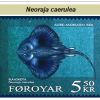Contribuții/Mesaje: 35
Limbă: English
orthohawk (Arată profil) 17 octombrie 2013, 18:13:11
erinja:Just get used to it and say "farti".I have a book titled "Esperanto in 50 Lessons" (I usually eschew titles of this sort, but I figured with Esperanto, it would work out well, and it does) by no less an Esperantujo personage as Edmond Privat and he has "Kiel vi sanas." I've taught both. Not surprisingly, the native English speakers tend toward "sanas" and the others toward "fartas"........
"Kiel vi statas" sounds weird, people don't generally say that. Part of learning a foreign language is getting used to sounds that may come out to say something funny in your own language.
The Esperanto word "maldikulo" (a thin person) sounds like it says "butt pain" in Italian ('mal di culo' ).
erinja (Arată profil) 17 octombrie 2013, 18:36:25
You can't twist and turn yourself when learning a language to avoid every single thing that might sound funny in your own language. It just won't work. Will you also, then, avoid using the word "homo", or using the past tense of the word "peni" (penis)?
Moosader (Arată profil) 17 octombrie 2013, 20:31:54
erinja:Maybe people said "Kiel vi sanas" a hundred years ago, but I have never heard that expression used in actual Esperanto conversation today, from native English speakers or from anyone else.What is the difference between Peni and Preni?
You can't twist and turn yourself when learning a language to avoid every single thing that might sound funny in your own language. It just won't work. Will you also, then, avoid using the word "homo", or using the past tense of the word "peni" (penis)?
I also tend to use "Ulo" in lieu of "Homo"
Kirilo81:If you pronounce the words correctly as ['fartas], ['bɔnɛ], and ['ʃatas], there should be no confusion.I dunno, I made an animation where several people said, "Kiel vi fartas?" / "Mi fartas bone", and I had to delete a bunch of YouTube comments about it.

Nile (Arată profil) 17 octombrie 2013, 22:22:44
I first thought it was weird using "homo" because it felt weird to say "human" all the time, but it's better than the trisyllabic "persono".
Moosader (Arată profil) 17 octombrie 2013, 23:57:01
Nile:Well, you can just use the Lernu Vortaro for that. peni=try preni=getOh, I meant provi. What's the difference between
I first thought it was weird using "homo" because it felt weird to say "human" all the time, but it's better than the trisyllabic "persono".
Provi - to try, to attempt, to test, to try out
Peni - to endeavour, to make an effort, to try
whysea (Arată profil) 18 octombrie 2013, 00:28:04
But how about "Kiel vi estas?"
A criticism of this choice could be that it is vague...but I'd imagine that most people would know what you're saying, and I'd like to mention that vagueness is often an opportunity to respond with a joke.
Duko (Arată profil) 18 octombrie 2013, 08:19:44
fajrkapo (Arată profil) 18 octombrie 2013, 08:30:11
sudanglo (Arată profil) 18 octombrie 2013, 09:20:39
Ĉu vi bonfartas/bonsanas?
Kiel progresas/iras la aferoj/la vivo?
Kiel vi?
Kirilo81 (Arată profil) 18 octombrie 2013, 09:49:35
whysea:But how about "Kiel vi estas?"Then the response should be "Mi estas bone", which of course is grammatically incorrect.
Duko's "Kiel vi?" as shortcut for "Kiel vi fartas?" is a viable option.







